Reflective Commentary: Healthcare Experiences and Ethical Dilemmas
VerifiedAdded on 2023/04/21
|13
|3307
|426
Report
AI Summary
This report presents a comprehensive reflective commentary on a student's healthcare placement experiences. It delves into various aspects of patient care, including interactions with patients facing complex health issues such as morbid obesity, osteoarthritis, and stroke, as well as ethical dilemmas related to patient autonomy and beneficence. The report utilizes the Gibbs reflection model to analyze experiences of teamwork dynamics, highlighting issues such as poor communication, medication errors, and power struggles within multidisciplinary teams. The commentary also explores the importance of cultural sensitivity and ethical considerations in patient care, particularly concerning a patient of African origin. Furthermore, it discusses breaches of patient confidentiality and their consequences. The student reflects on these experiences to identify areas for improvement in healthcare practices, emphasizing the significance of effective teamwork, ethical decision-making, and culturally competent care.
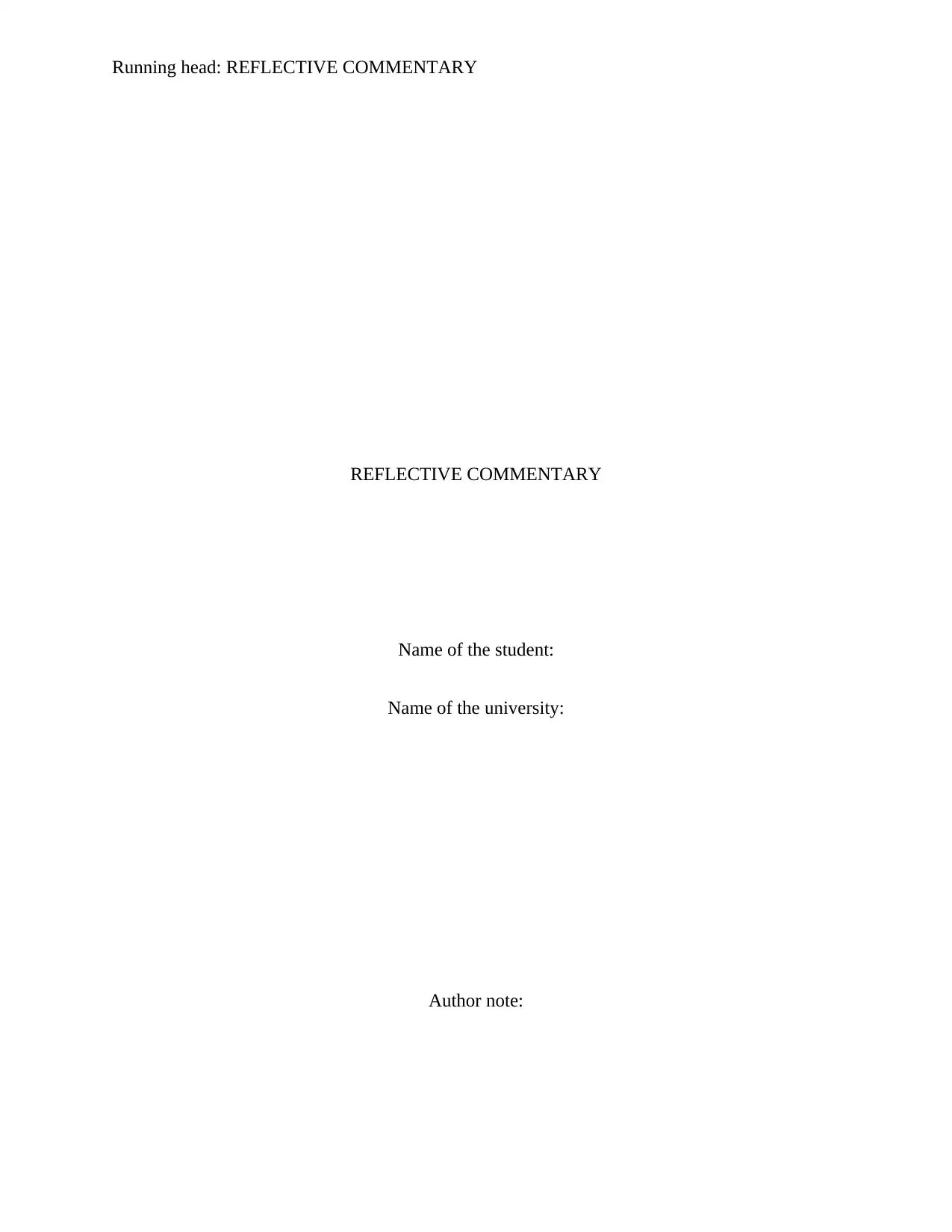
Running head: REFLECTIVE COMMENTARY
REFLECTIVE COMMENTARY
Name of the student:
Name of the university:
Author note:
REFLECTIVE COMMENTARY
Name of the student:
Name of the university:
Author note:
Paraphrase This Document
Need a fresh take? Get an instant paraphrase of this document with our AI Paraphraser
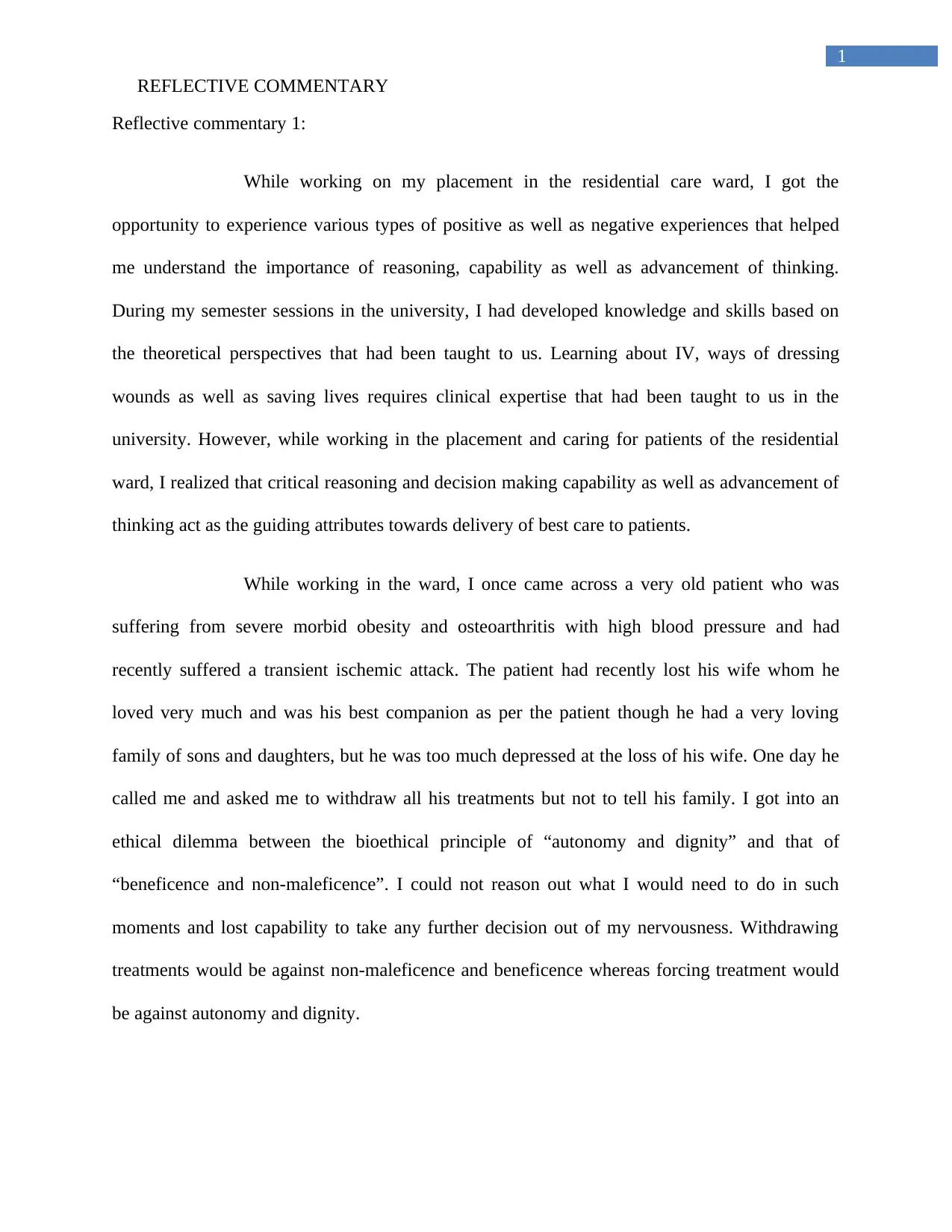
1
REFLECTIVE COMMENTARY
Reflective commentary 1:
While working on my placement in the residential care ward, I got the
opportunity to experience various types of positive as well as negative experiences that helped
me understand the importance of reasoning, capability as well as advancement of thinking.
During my semester sessions in the university, I had developed knowledge and skills based on
the theoretical perspectives that had been taught to us. Learning about IV, ways of dressing
wounds as well as saving lives requires clinical expertise that had been taught to us in the
university. However, while working in the placement and caring for patients of the residential
ward, I realized that critical reasoning and decision making capability as well as advancement of
thinking act as the guiding attributes towards delivery of best care to patients.
While working in the ward, I once came across a very old patient who was
suffering from severe morbid obesity and osteoarthritis with high blood pressure and had
recently suffered a transient ischemic attack. The patient had recently lost his wife whom he
loved very much and was his best companion as per the patient though he had a very loving
family of sons and daughters, but he was too much depressed at the loss of his wife. One day he
called me and asked me to withdraw all his treatments but not to tell his family. I got into an
ethical dilemma between the bioethical principle of “autonomy and dignity” and that of
“beneficence and non-maleficence”. I could not reason out what I would need to do in such
moments and lost capability to take any further decision out of my nervousness. Withdrawing
treatments would be against non-maleficence and beneficence whereas forcing treatment would
be against autonomy and dignity.
REFLECTIVE COMMENTARY
Reflective commentary 1:
While working on my placement in the residential care ward, I got the
opportunity to experience various types of positive as well as negative experiences that helped
me understand the importance of reasoning, capability as well as advancement of thinking.
During my semester sessions in the university, I had developed knowledge and skills based on
the theoretical perspectives that had been taught to us. Learning about IV, ways of dressing
wounds as well as saving lives requires clinical expertise that had been taught to us in the
university. However, while working in the placement and caring for patients of the residential
ward, I realized that critical reasoning and decision making capability as well as advancement of
thinking act as the guiding attributes towards delivery of best care to patients.
While working in the ward, I once came across a very old patient who was
suffering from severe morbid obesity and osteoarthritis with high blood pressure and had
recently suffered a transient ischemic attack. The patient had recently lost his wife whom he
loved very much and was his best companion as per the patient though he had a very loving
family of sons and daughters, but he was too much depressed at the loss of his wife. One day he
called me and asked me to withdraw all his treatments but not to tell his family. I got into an
ethical dilemma between the bioethical principle of “autonomy and dignity” and that of
“beneficence and non-maleficence”. I could not reason out what I would need to do in such
moments and lost capability to take any further decision out of my nervousness. Withdrawing
treatments would be against non-maleficence and beneficence whereas forcing treatment would
be against autonomy and dignity.
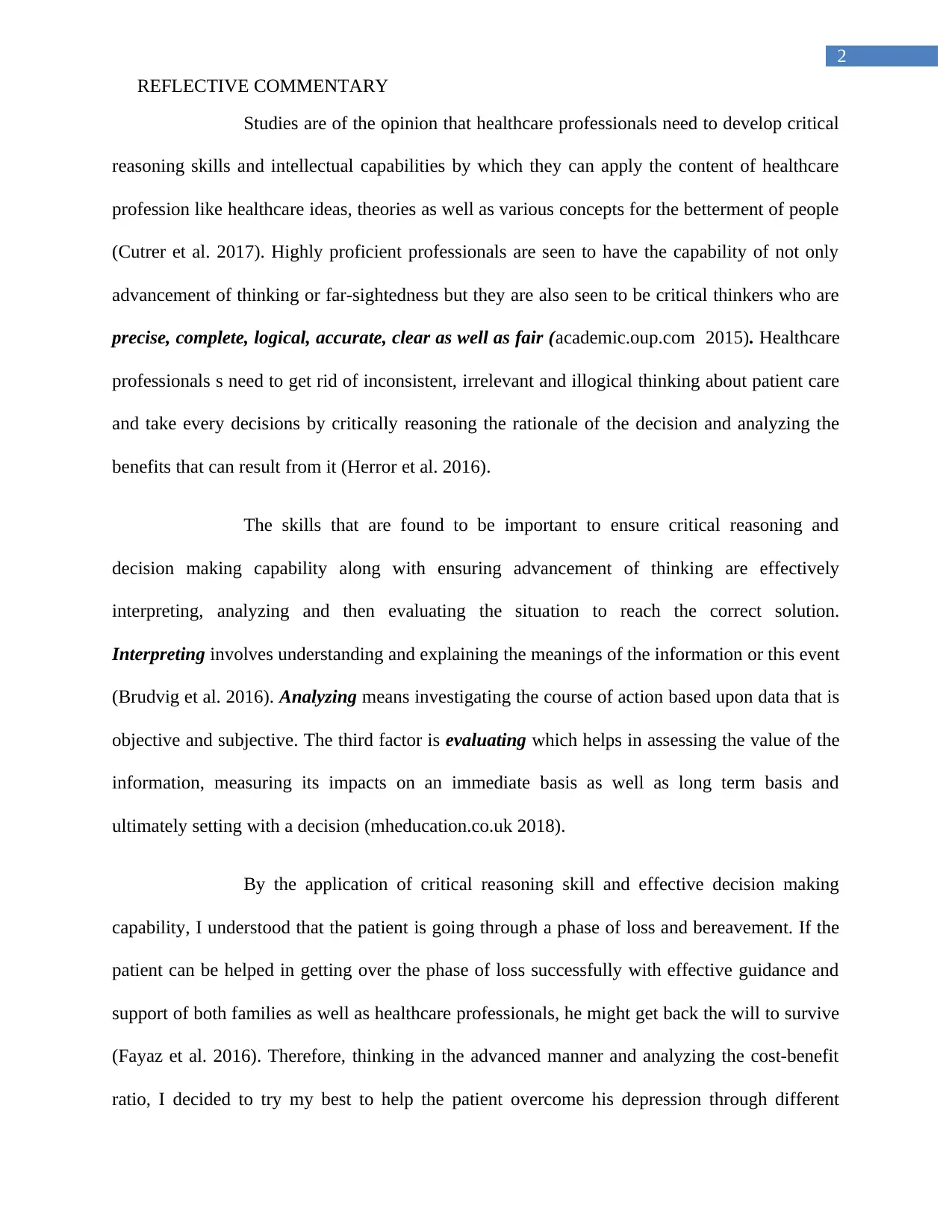
2
REFLECTIVE COMMENTARY
Studies are of the opinion that healthcare professionals need to develop critical
reasoning skills and intellectual capabilities by which they can apply the content of healthcare
profession like healthcare ideas, theories as well as various concepts for the betterment of people
(Cutrer et al. 2017). Highly proficient professionals are seen to have the capability of not only
advancement of thinking or far-sightedness but they are also seen to be critical thinkers who are
precise, complete, logical, accurate, clear as well as fair (academic.oup.com 2015). Healthcare
professionals s need to get rid of inconsistent, irrelevant and illogical thinking about patient care
and take every decisions by critically reasoning the rationale of the decision and analyzing the
benefits that can result from it (Herror et al. 2016).
The skills that are found to be important to ensure critical reasoning and
decision making capability along with ensuring advancement of thinking are effectively
interpreting, analyzing and then evaluating the situation to reach the correct solution.
Interpreting involves understanding and explaining the meanings of the information or this event
(Brudvig et al. 2016). Analyzing means investigating the course of action based upon data that is
objective and subjective. The third factor is evaluating which helps in assessing the value of the
information, measuring its impacts on an immediate basis as well as long term basis and
ultimately setting with a decision (mheducation.co.uk 2018).
By the application of critical reasoning skill and effective decision making
capability, I understood that the patient is going through a phase of loss and bereavement. If the
patient can be helped in getting over the phase of loss successfully with effective guidance and
support of both families as well as healthcare professionals, he might get back the will to survive
(Fayaz et al. 2016). Therefore, thinking in the advanced manner and analyzing the cost-benefit
ratio, I decided to try my best to help the patient overcome his depression through different
REFLECTIVE COMMENTARY
Studies are of the opinion that healthcare professionals need to develop critical
reasoning skills and intellectual capabilities by which they can apply the content of healthcare
profession like healthcare ideas, theories as well as various concepts for the betterment of people
(Cutrer et al. 2017). Highly proficient professionals are seen to have the capability of not only
advancement of thinking or far-sightedness but they are also seen to be critical thinkers who are
precise, complete, logical, accurate, clear as well as fair (academic.oup.com 2015). Healthcare
professionals s need to get rid of inconsistent, irrelevant and illogical thinking about patient care
and take every decisions by critically reasoning the rationale of the decision and analyzing the
benefits that can result from it (Herror et al. 2016).
The skills that are found to be important to ensure critical reasoning and
decision making capability along with ensuring advancement of thinking are effectively
interpreting, analyzing and then evaluating the situation to reach the correct solution.
Interpreting involves understanding and explaining the meanings of the information or this event
(Brudvig et al. 2016). Analyzing means investigating the course of action based upon data that is
objective and subjective. The third factor is evaluating which helps in assessing the value of the
information, measuring its impacts on an immediate basis as well as long term basis and
ultimately setting with a decision (mheducation.co.uk 2018).
By the application of critical reasoning skill and effective decision making
capability, I understood that the patient is going through a phase of loss and bereavement. If the
patient can be helped in getting over the phase of loss successfully with effective guidance and
support of both families as well as healthcare professionals, he might get back the will to survive
(Fayaz et al. 2016). Therefore, thinking in the advanced manner and analyzing the cost-benefit
ratio, I decided to try my best to help the patient overcome his depression through different
⊘ This is a preview!⊘
Do you want full access?
Subscribe today to unlock all pages.

Trusted by 1+ million students worldwide
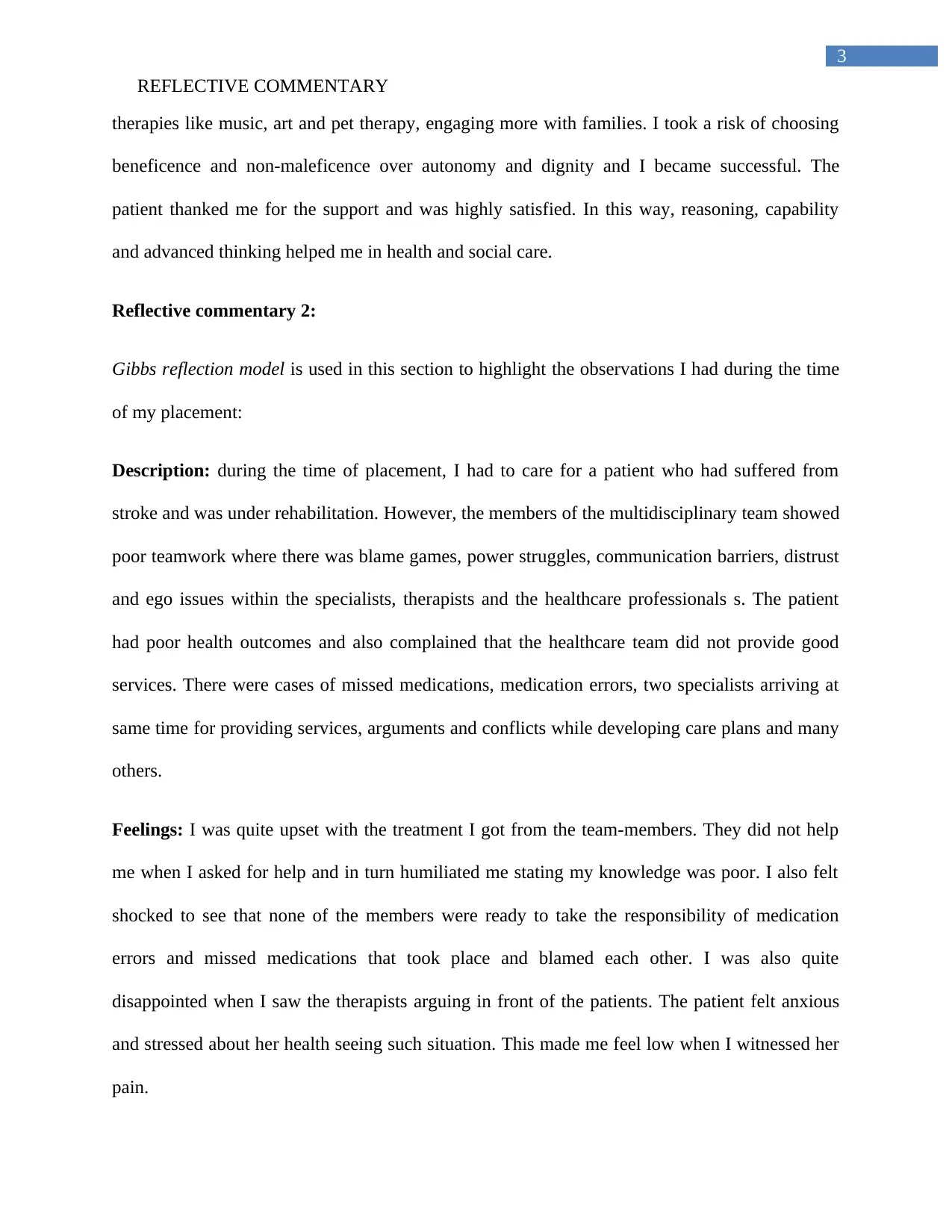
3
REFLECTIVE COMMENTARY
therapies like music, art and pet therapy, engaging more with families. I took a risk of choosing
beneficence and non-maleficence over autonomy and dignity and I became successful. The
patient thanked me for the support and was highly satisfied. In this way, reasoning, capability
and advanced thinking helped me in health and social care.
Reflective commentary 2:
Gibbs reflection model is used in this section to highlight the observations I had during the time
of my placement:
Description: during the time of placement, I had to care for a patient who had suffered from
stroke and was under rehabilitation. However, the members of the multidisciplinary team showed
poor teamwork where there was blame games, power struggles, communication barriers, distrust
and ego issues within the specialists, therapists and the healthcare professionals s. The patient
had poor health outcomes and also complained that the healthcare team did not provide good
services. There were cases of missed medications, medication errors, two specialists arriving at
same time for providing services, arguments and conflicts while developing care plans and many
others.
Feelings: I was quite upset with the treatment I got from the team-members. They did not help
me when I asked for help and in turn humiliated me stating my knowledge was poor. I also felt
shocked to see that none of the members were ready to take the responsibility of medication
errors and missed medications that took place and blamed each other. I was also quite
disappointed when I saw the therapists arguing in front of the patients. The patient felt anxious
and stressed about her health seeing such situation. This made me feel low when I witnessed her
pain.
REFLECTIVE COMMENTARY
therapies like music, art and pet therapy, engaging more with families. I took a risk of choosing
beneficence and non-maleficence over autonomy and dignity and I became successful. The
patient thanked me for the support and was highly satisfied. In this way, reasoning, capability
and advanced thinking helped me in health and social care.
Reflective commentary 2:
Gibbs reflection model is used in this section to highlight the observations I had during the time
of my placement:
Description: during the time of placement, I had to care for a patient who had suffered from
stroke and was under rehabilitation. However, the members of the multidisciplinary team showed
poor teamwork where there was blame games, power struggles, communication barriers, distrust
and ego issues within the specialists, therapists and the healthcare professionals s. The patient
had poor health outcomes and also complained that the healthcare team did not provide good
services. There were cases of missed medications, medication errors, two specialists arriving at
same time for providing services, arguments and conflicts while developing care plans and many
others.
Feelings: I was quite upset with the treatment I got from the team-members. They did not help
me when I asked for help and in turn humiliated me stating my knowledge was poor. I also felt
shocked to see that none of the members were ready to take the responsibility of medication
errors and missed medications that took place and blamed each other. I was also quite
disappointed when I saw the therapists arguing in front of the patients. The patient felt anxious
and stressed about her health seeing such situation. This made me feel low when I witnessed her
pain.
Paraphrase This Document
Need a fresh take? Get an instant paraphrase of this document with our AI Paraphraser
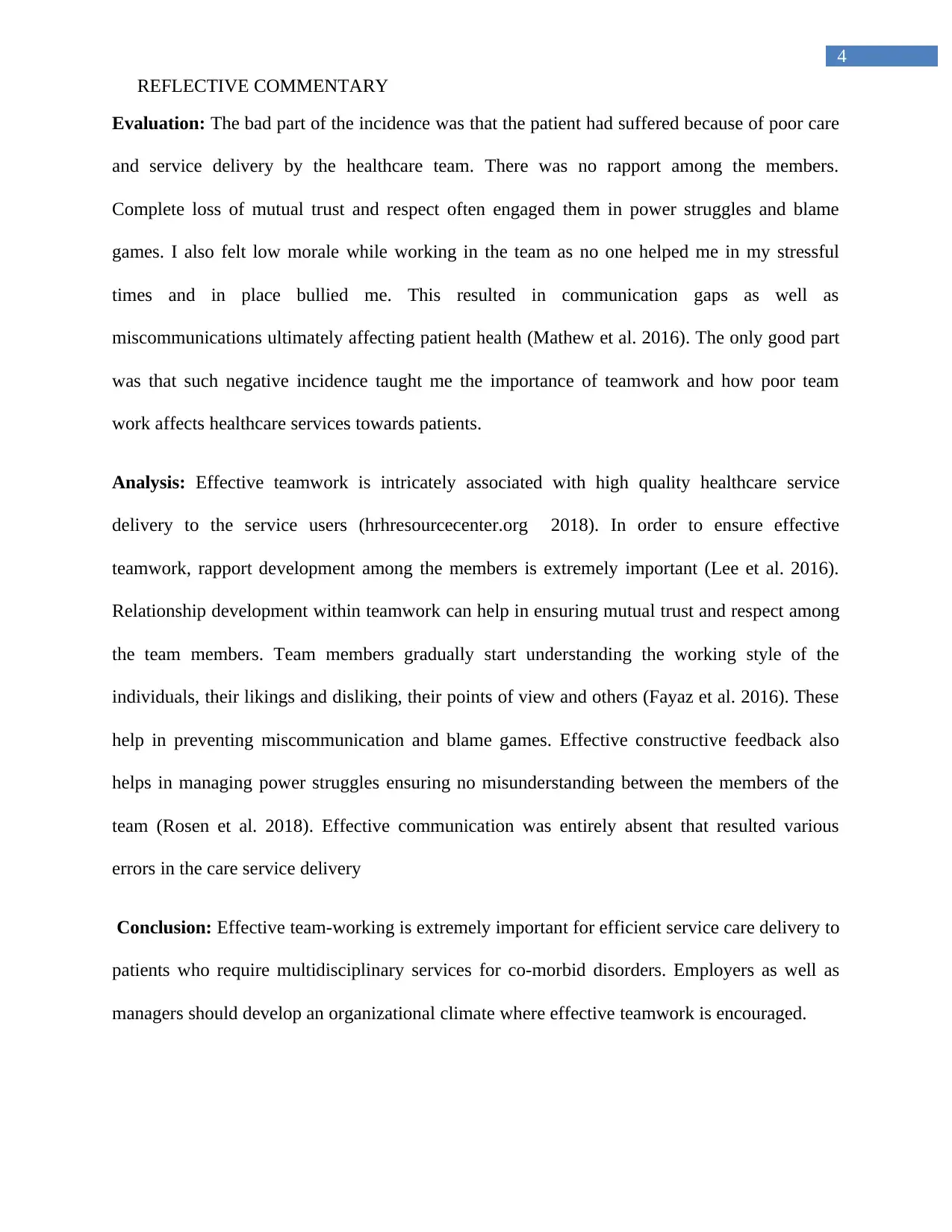
4
REFLECTIVE COMMENTARY
Evaluation: The bad part of the incidence was that the patient had suffered because of poor care
and service delivery by the healthcare team. There was no rapport among the members.
Complete loss of mutual trust and respect often engaged them in power struggles and blame
games. I also felt low morale while working in the team as no one helped me in my stressful
times and in place bullied me. This resulted in communication gaps as well as
miscommunications ultimately affecting patient health (Mathew et al. 2016). The only good part
was that such negative incidence taught me the importance of teamwork and how poor team
work affects healthcare services towards patients.
Analysis: Effective teamwork is intricately associated with high quality healthcare service
delivery to the service users (hrhresourcecenter.org 2018). In order to ensure effective
teamwork, rapport development among the members is extremely important (Lee et al. 2016).
Relationship development within teamwork can help in ensuring mutual trust and respect among
the team members. Team members gradually start understanding the working style of the
individuals, their likings and disliking, their points of view and others (Fayaz et al. 2016). These
help in preventing miscommunication and blame games. Effective constructive feedback also
helps in managing power struggles ensuring no misunderstanding between the members of the
team (Rosen et al. 2018). Effective communication was entirely absent that resulted various
errors in the care service delivery
Conclusion: Effective team-working is extremely important for efficient service care delivery to
patients who require multidisciplinary services for co-morbid disorders. Employers as well as
managers should develop an organizational climate where effective teamwork is encouraged.
REFLECTIVE COMMENTARY
Evaluation: The bad part of the incidence was that the patient had suffered because of poor care
and service delivery by the healthcare team. There was no rapport among the members.
Complete loss of mutual trust and respect often engaged them in power struggles and blame
games. I also felt low morale while working in the team as no one helped me in my stressful
times and in place bullied me. This resulted in communication gaps as well as
miscommunications ultimately affecting patient health (Mathew et al. 2016). The only good part
was that such negative incidence taught me the importance of teamwork and how poor team
work affects healthcare services towards patients.
Analysis: Effective teamwork is intricately associated with high quality healthcare service
delivery to the service users (hrhresourcecenter.org 2018). In order to ensure effective
teamwork, rapport development among the members is extremely important (Lee et al. 2016).
Relationship development within teamwork can help in ensuring mutual trust and respect among
the team members. Team members gradually start understanding the working style of the
individuals, their likings and disliking, their points of view and others (Fayaz et al. 2016). These
help in preventing miscommunication and blame games. Effective constructive feedback also
helps in managing power struggles ensuring no misunderstanding between the members of the
team (Rosen et al. 2018). Effective communication was entirely absent that resulted various
errors in the care service delivery
Conclusion: Effective team-working is extremely important for efficient service care delivery to
patients who require multidisciplinary services for co-morbid disorders. Employers as well as
managers should develop an organizational climate where effective teamwork is encouraged.
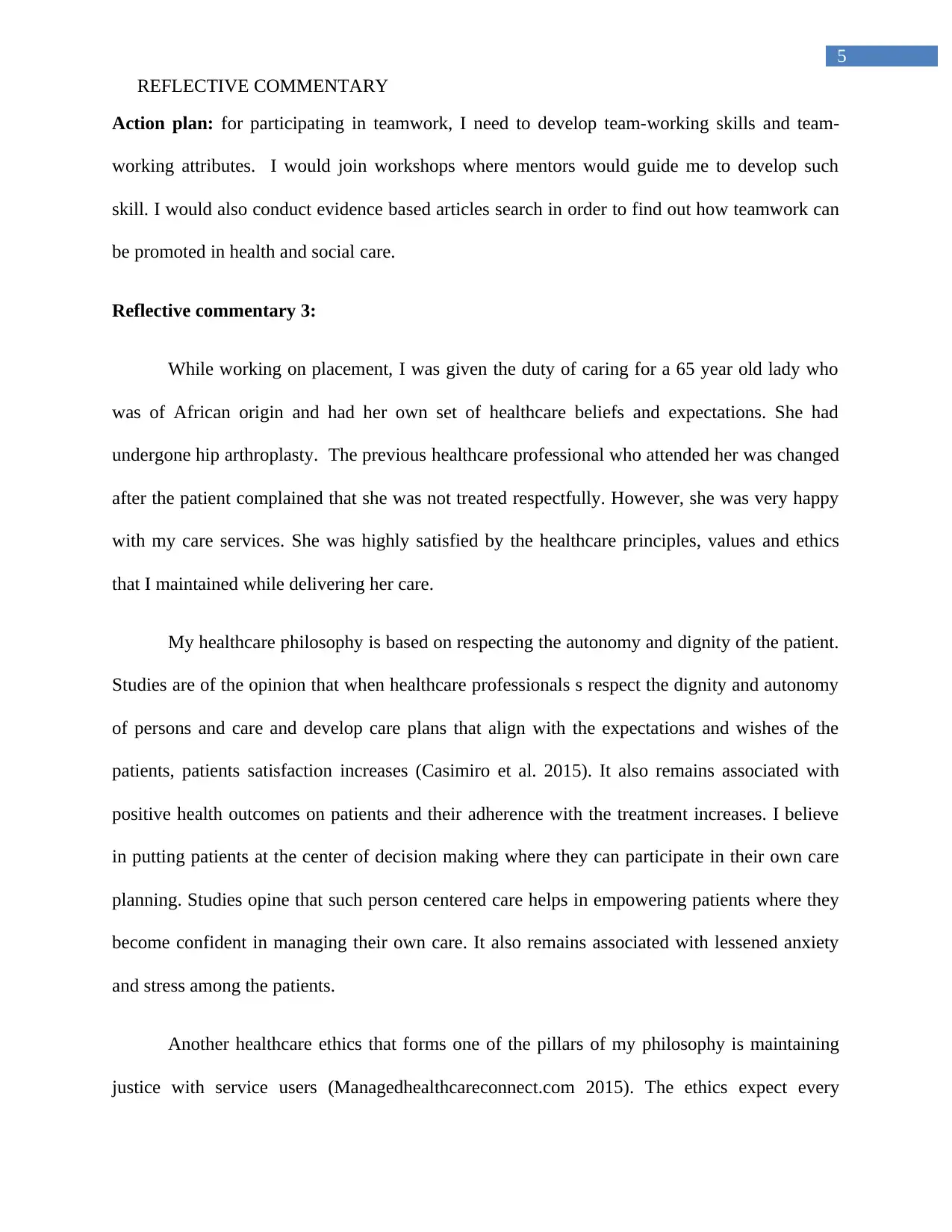
5
REFLECTIVE COMMENTARY
Action plan: for participating in teamwork, I need to develop team-working skills and team-
working attributes. I would join workshops where mentors would guide me to develop such
skill. I would also conduct evidence based articles search in order to find out how teamwork can
be promoted in health and social care.
Reflective commentary 3:
While working on placement, I was given the duty of caring for a 65 year old lady who
was of African origin and had her own set of healthcare beliefs and expectations. She had
undergone hip arthroplasty. The previous healthcare professional who attended her was changed
after the patient complained that she was not treated respectfully. However, she was very happy
with my care services. She was highly satisfied by the healthcare principles, values and ethics
that I maintained while delivering her care.
My healthcare philosophy is based on respecting the autonomy and dignity of the patient.
Studies are of the opinion that when healthcare professionals s respect the dignity and autonomy
of persons and care and develop care plans that align with the expectations and wishes of the
patients, patients satisfaction increases (Casimiro et al. 2015). It also remains associated with
positive health outcomes on patients and their adherence with the treatment increases. I believe
in putting patients at the center of decision making where they can participate in their own care
planning. Studies opine that such person centered care helps in empowering patients where they
become confident in managing their own care. It also remains associated with lessened anxiety
and stress among the patients.
Another healthcare ethics that forms one of the pillars of my philosophy is maintaining
justice with service users (Managedhealthcareconnect.com 2015). The ethics expect every
REFLECTIVE COMMENTARY
Action plan: for participating in teamwork, I need to develop team-working skills and team-
working attributes. I would join workshops where mentors would guide me to develop such
skill. I would also conduct evidence based articles search in order to find out how teamwork can
be promoted in health and social care.
Reflective commentary 3:
While working on placement, I was given the duty of caring for a 65 year old lady who
was of African origin and had her own set of healthcare beliefs and expectations. She had
undergone hip arthroplasty. The previous healthcare professional who attended her was changed
after the patient complained that she was not treated respectfully. However, she was very happy
with my care services. She was highly satisfied by the healthcare principles, values and ethics
that I maintained while delivering her care.
My healthcare philosophy is based on respecting the autonomy and dignity of the patient.
Studies are of the opinion that when healthcare professionals s respect the dignity and autonomy
of persons and care and develop care plans that align with the expectations and wishes of the
patients, patients satisfaction increases (Casimiro et al. 2015). It also remains associated with
positive health outcomes on patients and their adherence with the treatment increases. I believe
in putting patients at the center of decision making where they can participate in their own care
planning. Studies opine that such person centered care helps in empowering patients where they
become confident in managing their own care. It also remains associated with lessened anxiety
and stress among the patients.
Another healthcare ethics that forms one of the pillars of my philosophy is maintaining
justice with service users (Managedhealthcareconnect.com 2015). The ethics expect every
⊘ This is a preview!⊘
Do you want full access?
Subscribe today to unlock all pages.

Trusted by 1+ million students worldwide
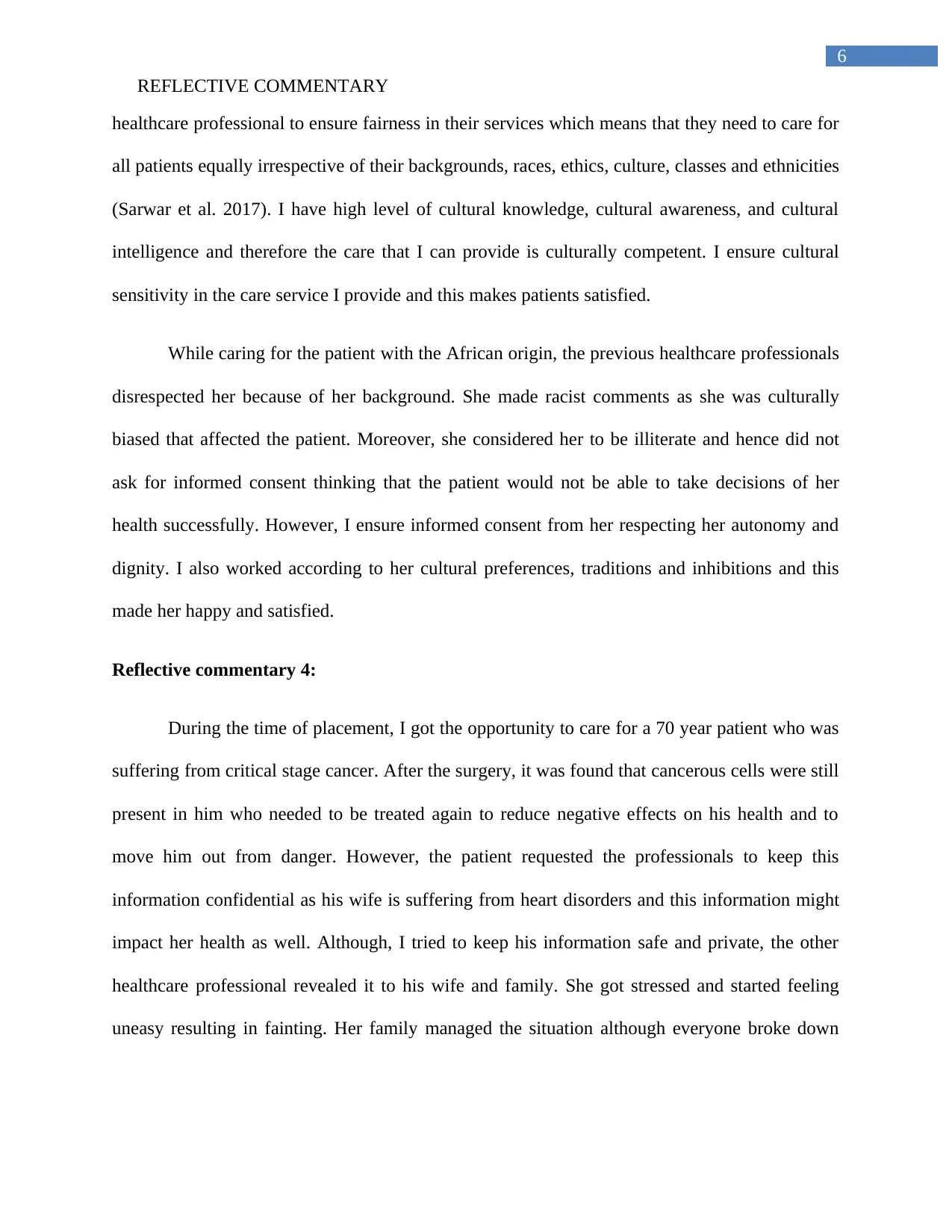
6
REFLECTIVE COMMENTARY
healthcare professional to ensure fairness in their services which means that they need to care for
all patients equally irrespective of their backgrounds, races, ethics, culture, classes and ethnicities
(Sarwar et al. 2017). I have high level of cultural knowledge, cultural awareness, and cultural
intelligence and therefore the care that I can provide is culturally competent. I ensure cultural
sensitivity in the care service I provide and this makes patients satisfied.
While caring for the patient with the African origin, the previous healthcare professionals
disrespected her because of her background. She made racist comments as she was culturally
biased that affected the patient. Moreover, she considered her to be illiterate and hence did not
ask for informed consent thinking that the patient would not be able to take decisions of her
health successfully. However, I ensure informed consent from her respecting her autonomy and
dignity. I also worked according to her cultural preferences, traditions and inhibitions and this
made her happy and satisfied.
Reflective commentary 4:
During the time of placement, I got the opportunity to care for a 70 year patient who was
suffering from critical stage cancer. After the surgery, it was found that cancerous cells were still
present in him who needed to be treated again to reduce negative effects on his health and to
move him out from danger. However, the patient requested the professionals to keep this
information confidential as his wife is suffering from heart disorders and this information might
impact her health as well. Although, I tried to keep his information safe and private, the other
healthcare professional revealed it to his wife and family. She got stressed and started feeling
uneasy resulting in fainting. Her family managed the situation although everyone broke down
REFLECTIVE COMMENTARY
healthcare professional to ensure fairness in their services which means that they need to care for
all patients equally irrespective of their backgrounds, races, ethics, culture, classes and ethnicities
(Sarwar et al. 2017). I have high level of cultural knowledge, cultural awareness, and cultural
intelligence and therefore the care that I can provide is culturally competent. I ensure cultural
sensitivity in the care service I provide and this makes patients satisfied.
While caring for the patient with the African origin, the previous healthcare professionals
disrespected her because of her background. She made racist comments as she was culturally
biased that affected the patient. Moreover, she considered her to be illiterate and hence did not
ask for informed consent thinking that the patient would not be able to take decisions of her
health successfully. However, I ensure informed consent from her respecting her autonomy and
dignity. I also worked according to her cultural preferences, traditions and inhibitions and this
made her happy and satisfied.
Reflective commentary 4:
During the time of placement, I got the opportunity to care for a 70 year patient who was
suffering from critical stage cancer. After the surgery, it was found that cancerous cells were still
present in him who needed to be treated again to reduce negative effects on his health and to
move him out from danger. However, the patient requested the professionals to keep this
information confidential as his wife is suffering from heart disorders and this information might
impact her health as well. Although, I tried to keep his information safe and private, the other
healthcare professional revealed it to his wife and family. She got stressed and started feeling
uneasy resulting in fainting. Her family managed the situation although everyone broke down
Paraphrase This Document
Need a fresh take? Get an instant paraphrase of this document with our AI Paraphraser
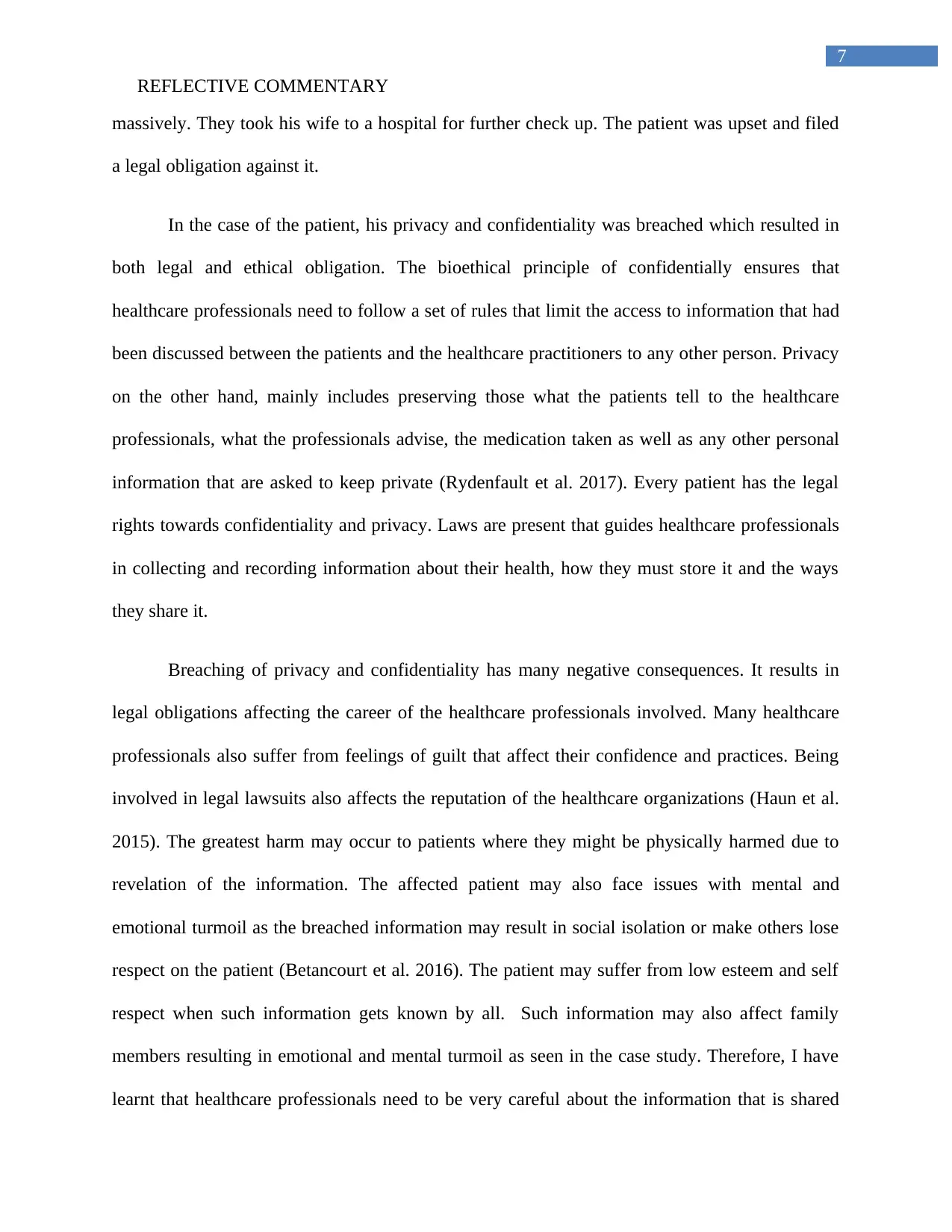
7
REFLECTIVE COMMENTARY
massively. They took his wife to a hospital for further check up. The patient was upset and filed
a legal obligation against it.
In the case of the patient, his privacy and confidentiality was breached which resulted in
both legal and ethical obligation. The bioethical principle of confidentially ensures that
healthcare professionals need to follow a set of rules that limit the access to information that had
been discussed between the patients and the healthcare practitioners to any other person. Privacy
on the other hand, mainly includes preserving those what the patients tell to the healthcare
professionals, what the professionals advise, the medication taken as well as any other personal
information that are asked to keep private (Rydenfault et al. 2017). Every patient has the legal
rights towards confidentiality and privacy. Laws are present that guides healthcare professionals
in collecting and recording information about their health, how they must store it and the ways
they share it.
Breaching of privacy and confidentiality has many negative consequences. It results in
legal obligations affecting the career of the healthcare professionals involved. Many healthcare
professionals also suffer from feelings of guilt that affect their confidence and practices. Being
involved in legal lawsuits also affects the reputation of the healthcare organizations (Haun et al.
2015). The greatest harm may occur to patients where they might be physically harmed due to
revelation of the information. The affected patient may also face issues with mental and
emotional turmoil as the breached information may result in social isolation or make others lose
respect on the patient (Betancourt et al. 2016). The patient may suffer from low esteem and self
respect when such information gets known by all. Such information may also affect family
members resulting in emotional and mental turmoil as seen in the case study. Therefore, I have
learnt that healthcare professionals need to be very careful about the information that is shared
REFLECTIVE COMMENTARY
massively. They took his wife to a hospital for further check up. The patient was upset and filed
a legal obligation against it.
In the case of the patient, his privacy and confidentiality was breached which resulted in
both legal and ethical obligation. The bioethical principle of confidentially ensures that
healthcare professionals need to follow a set of rules that limit the access to information that had
been discussed between the patients and the healthcare practitioners to any other person. Privacy
on the other hand, mainly includes preserving those what the patients tell to the healthcare
professionals, what the professionals advise, the medication taken as well as any other personal
information that are asked to keep private (Rydenfault et al. 2017). Every patient has the legal
rights towards confidentiality and privacy. Laws are present that guides healthcare professionals
in collecting and recording information about their health, how they must store it and the ways
they share it.
Breaching of privacy and confidentiality has many negative consequences. It results in
legal obligations affecting the career of the healthcare professionals involved. Many healthcare
professionals also suffer from feelings of guilt that affect their confidence and practices. Being
involved in legal lawsuits also affects the reputation of the healthcare organizations (Haun et al.
2015). The greatest harm may occur to patients where they might be physically harmed due to
revelation of the information. The affected patient may also face issues with mental and
emotional turmoil as the breached information may result in social isolation or make others lose
respect on the patient (Betancourt et al. 2016). The patient may suffer from low esteem and self
respect when such information gets known by all. Such information may also affect family
members resulting in emotional and mental turmoil as seen in the case study. Therefore, I have
learnt that healthcare professionals need to be very careful about the information that is shared
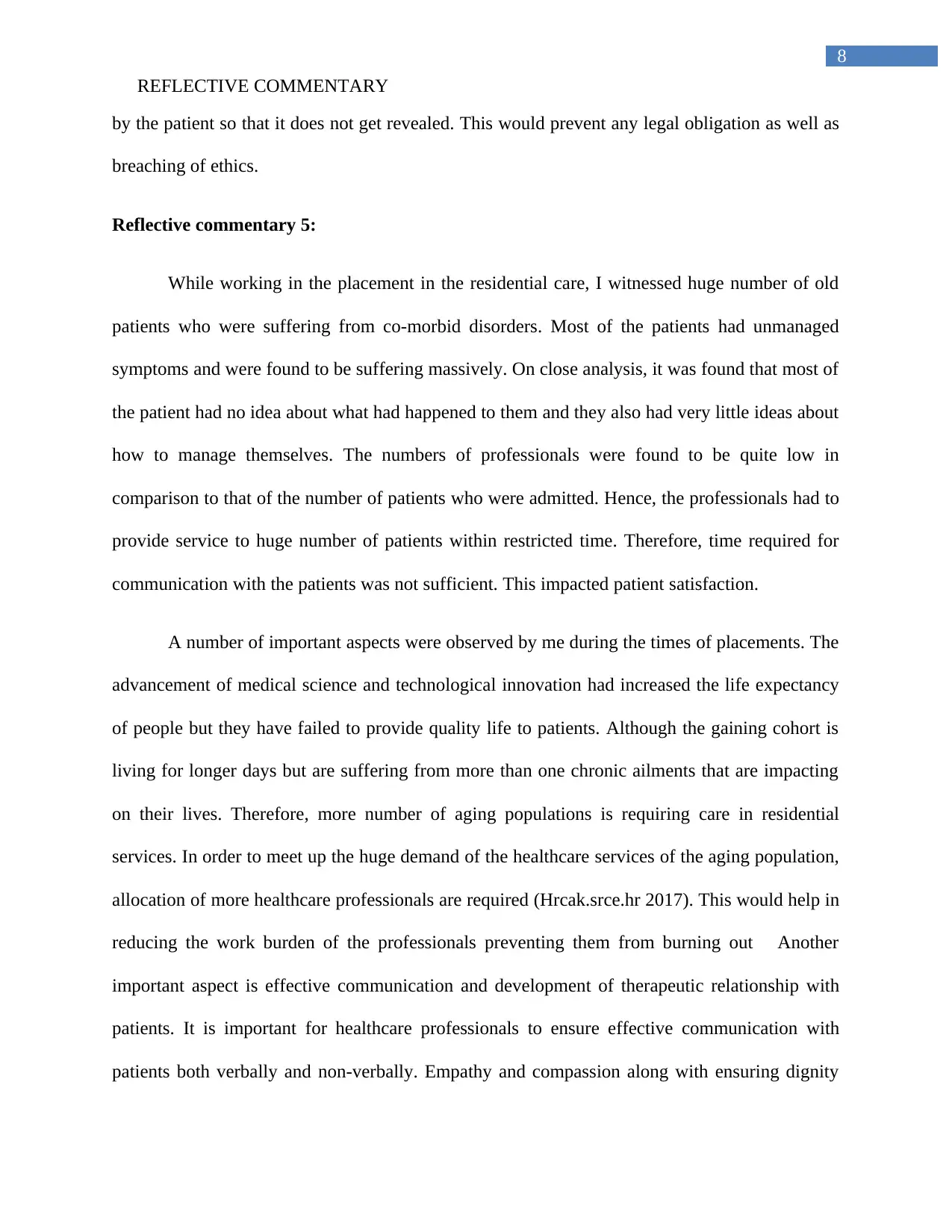
8
REFLECTIVE COMMENTARY
by the patient so that it does not get revealed. This would prevent any legal obligation as well as
breaching of ethics.
Reflective commentary 5:
While working in the placement in the residential care, I witnessed huge number of old
patients who were suffering from co-morbid disorders. Most of the patients had unmanaged
symptoms and were found to be suffering massively. On close analysis, it was found that most of
the patient had no idea about what had happened to them and they also had very little ideas about
how to manage themselves. The numbers of professionals were found to be quite low in
comparison to that of the number of patients who were admitted. Hence, the professionals had to
provide service to huge number of patients within restricted time. Therefore, time required for
communication with the patients was not sufficient. This impacted patient satisfaction.
A number of important aspects were observed by me during the times of placements. The
advancement of medical science and technological innovation had increased the life expectancy
of people but they have failed to provide quality life to patients. Although the gaining cohort is
living for longer days but are suffering from more than one chronic ailments that are impacting
on their lives. Therefore, more number of aging populations is requiring care in residential
services. In order to meet up the huge demand of the healthcare services of the aging population,
allocation of more healthcare professionals are required (Hrcak.srce.hr 2017). This would help in
reducing the work burden of the professionals preventing them from burning out Another
important aspect is effective communication and development of therapeutic relationship with
patients. It is important for healthcare professionals to ensure effective communication with
patients both verbally and non-verbally. Empathy and compassion along with ensuring dignity
REFLECTIVE COMMENTARY
by the patient so that it does not get revealed. This would prevent any legal obligation as well as
breaching of ethics.
Reflective commentary 5:
While working in the placement in the residential care, I witnessed huge number of old
patients who were suffering from co-morbid disorders. Most of the patients had unmanaged
symptoms and were found to be suffering massively. On close analysis, it was found that most of
the patient had no idea about what had happened to them and they also had very little ideas about
how to manage themselves. The numbers of professionals were found to be quite low in
comparison to that of the number of patients who were admitted. Hence, the professionals had to
provide service to huge number of patients within restricted time. Therefore, time required for
communication with the patients was not sufficient. This impacted patient satisfaction.
A number of important aspects were observed by me during the times of placements. The
advancement of medical science and technological innovation had increased the life expectancy
of people but they have failed to provide quality life to patients. Although the gaining cohort is
living for longer days but are suffering from more than one chronic ailments that are impacting
on their lives. Therefore, more number of aging populations is requiring care in residential
services. In order to meet up the huge demand of the healthcare services of the aging population,
allocation of more healthcare professionals are required (Hrcak.srce.hr 2017). This would help in
reducing the work burden of the professionals preventing them from burning out Another
important aspect is effective communication and development of therapeutic relationship with
patients. It is important for healthcare professionals to ensure effective communication with
patients both verbally and non-verbally. Empathy and compassion along with ensuring dignity
⊘ This is a preview!⊘
Do you want full access?
Subscribe today to unlock all pages.

Trusted by 1+ million students worldwide
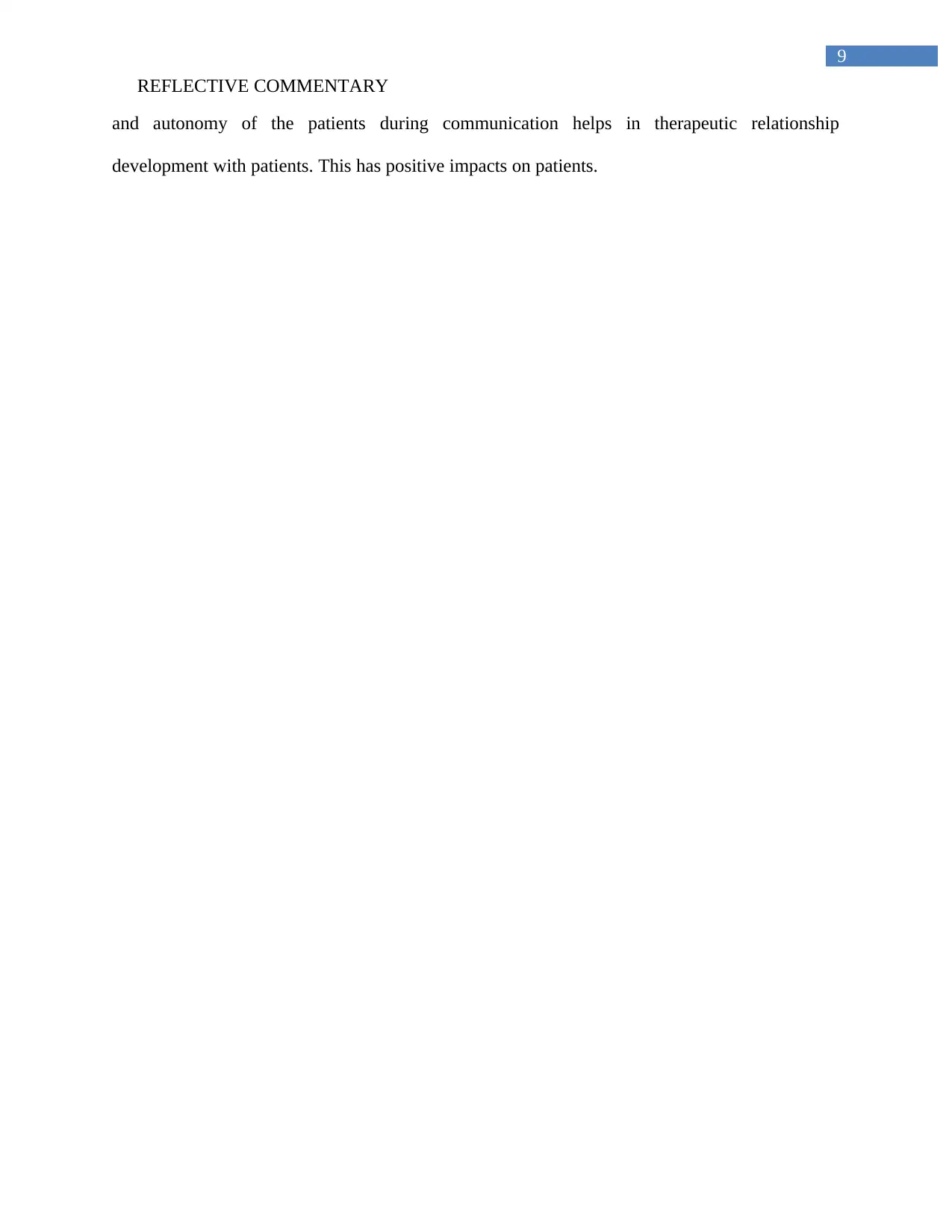
9
REFLECTIVE COMMENTARY
and autonomy of the patients during communication helps in therapeutic relationship
development with patients. This has positive impacts on patients.
REFLECTIVE COMMENTARY
and autonomy of the patients during communication helps in therapeutic relationship
development with patients. This has positive impacts on patients.
Paraphrase This Document
Need a fresh take? Get an instant paraphrase of this document with our AI Paraphraser
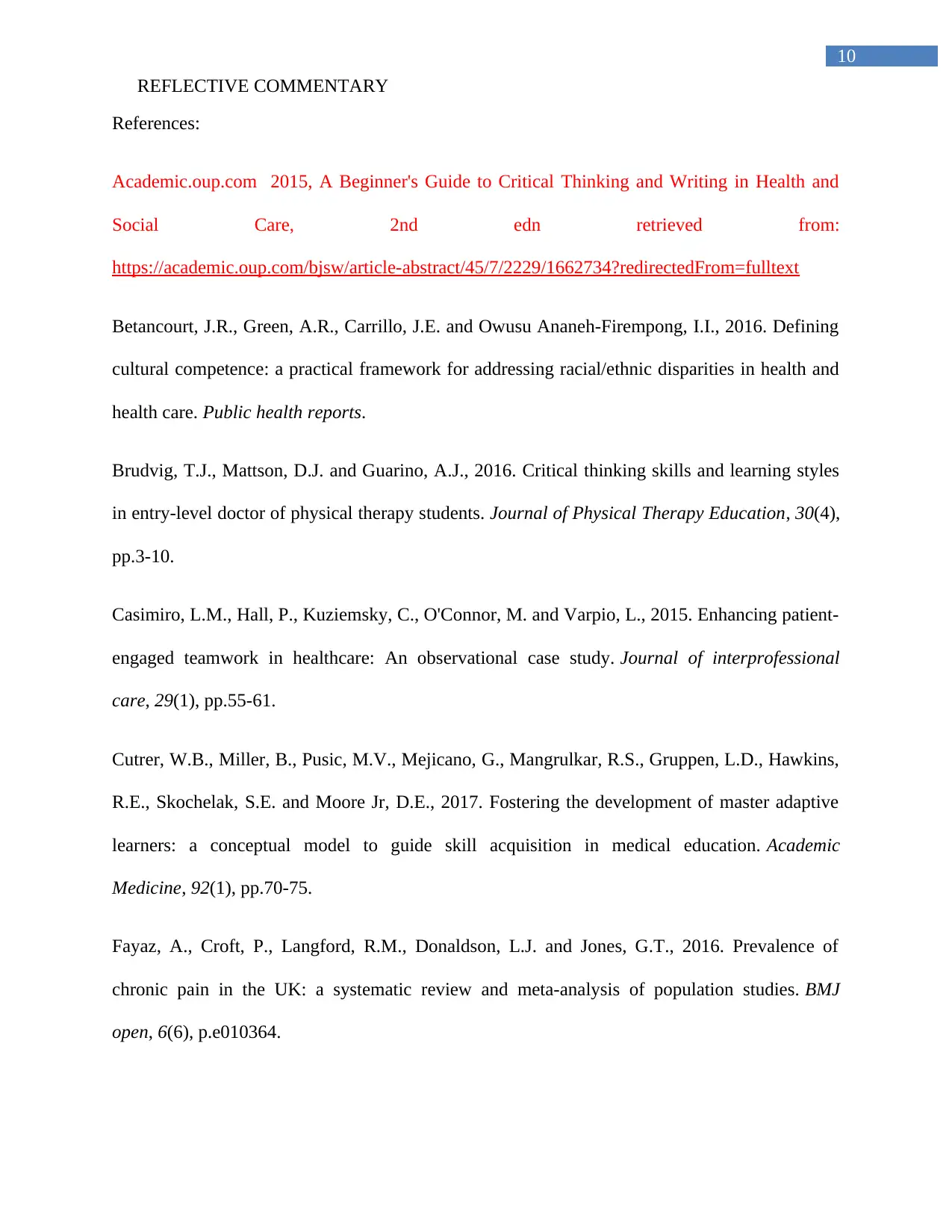
10
REFLECTIVE COMMENTARY
References:
Academic.oup.com 2015, A Beginner's Guide to Critical Thinking and Writing in Health and
Social Care, 2nd edn retrieved from:
https://academic.oup.com/bjsw/article-abstract/45/7/2229/1662734?redirectedFrom=fulltext
Betancourt, J.R., Green, A.R., Carrillo, J.E. and Owusu Ananeh-Firempong, I.I., 2016. Defining
cultural competence: a practical framework for addressing racial/ethnic disparities in health and
health care. Public health reports.
Brudvig, T.J., Mattson, D.J. and Guarino, A.J., 2016. Critical thinking skills and learning styles
in entry-level doctor of physical therapy students. Journal of Physical Therapy Education, 30(4),
pp.3-10.
Casimiro, L.M., Hall, P., Kuziemsky, C., O'Connor, M. and Varpio, L., 2015. Enhancing patient-
engaged teamwork in healthcare: An observational case study. Journal of interprofessional
care, 29(1), pp.55-61.
Cutrer, W.B., Miller, B., Pusic, M.V., Mejicano, G., Mangrulkar, R.S., Gruppen, L.D., Hawkins,
R.E., Skochelak, S.E. and Moore Jr, D.E., 2017. Fostering the development of master adaptive
learners: a conceptual model to guide skill acquisition in medical education. Academic
Medicine, 92(1), pp.70-75.
Fayaz, A., Croft, P., Langford, R.M., Donaldson, L.J. and Jones, G.T., 2016. Prevalence of
chronic pain in the UK: a systematic review and meta-analysis of population studies. BMJ
open, 6(6), p.e010364.
REFLECTIVE COMMENTARY
References:
Academic.oup.com 2015, A Beginner's Guide to Critical Thinking and Writing in Health and
Social Care, 2nd edn retrieved from:
https://academic.oup.com/bjsw/article-abstract/45/7/2229/1662734?redirectedFrom=fulltext
Betancourt, J.R., Green, A.R., Carrillo, J.E. and Owusu Ananeh-Firempong, I.I., 2016. Defining
cultural competence: a practical framework for addressing racial/ethnic disparities in health and
health care. Public health reports.
Brudvig, T.J., Mattson, D.J. and Guarino, A.J., 2016. Critical thinking skills and learning styles
in entry-level doctor of physical therapy students. Journal of Physical Therapy Education, 30(4),
pp.3-10.
Casimiro, L.M., Hall, P., Kuziemsky, C., O'Connor, M. and Varpio, L., 2015. Enhancing patient-
engaged teamwork in healthcare: An observational case study. Journal of interprofessional
care, 29(1), pp.55-61.
Cutrer, W.B., Miller, B., Pusic, M.V., Mejicano, G., Mangrulkar, R.S., Gruppen, L.D., Hawkins,
R.E., Skochelak, S.E. and Moore Jr, D.E., 2017. Fostering the development of master adaptive
learners: a conceptual model to guide skill acquisition in medical education. Academic
Medicine, 92(1), pp.70-75.
Fayaz, A., Croft, P., Langford, R.M., Donaldson, L.J. and Jones, G.T., 2016. Prevalence of
chronic pain in the UK: a systematic review and meta-analysis of population studies. BMJ
open, 6(6), p.e010364.
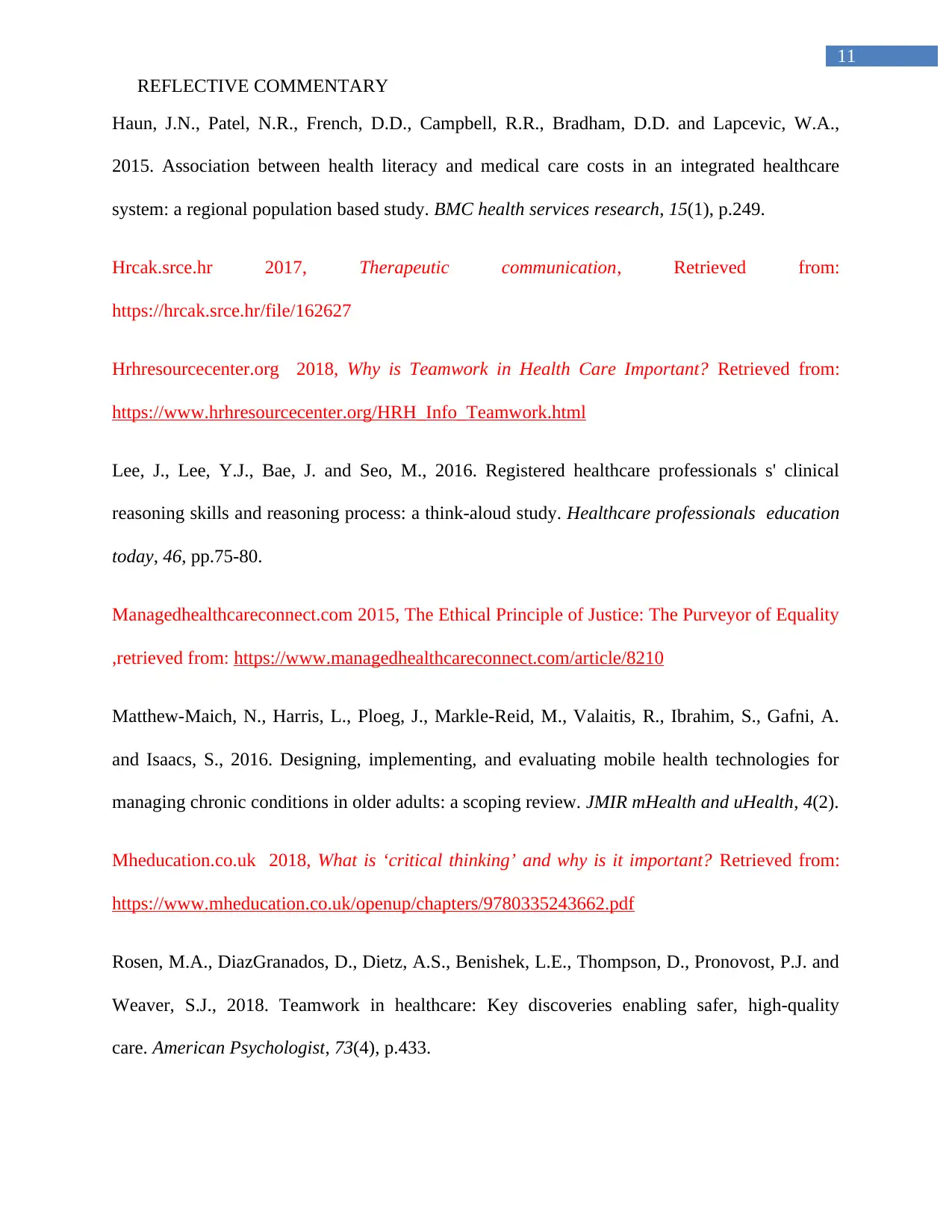
11
REFLECTIVE COMMENTARY
Haun, J.N., Patel, N.R., French, D.D., Campbell, R.R., Bradham, D.D. and Lapcevic, W.A.,
2015. Association between health literacy and medical care costs in an integrated healthcare
system: a regional population based study. BMC health services research, 15(1), p.249.
Hrcak.srce.hr 2017, Therapeutic communication, Retrieved from:
https://hrcak.srce.hr/file/162627
Hrhresourcecenter.org 2018, Why is Teamwork in Health Care Important? Retrieved from:
https://www.hrhresourcecenter.org/HRH_Info_Teamwork.html
Lee, J., Lee, Y.J., Bae, J. and Seo, M., 2016. Registered healthcare professionals s' clinical
reasoning skills and reasoning process: a think-aloud study. Healthcare professionals education
today, 46, pp.75-80.
Managedhealthcareconnect.com 2015, The Ethical Principle of Justice: The Purveyor of Equality
,retrieved from: https://www.managedhealthcareconnect.com/article/8210
Matthew-Maich, N., Harris, L., Ploeg, J., Markle-Reid, M., Valaitis, R., Ibrahim, S., Gafni, A.
and Isaacs, S., 2016. Designing, implementing, and evaluating mobile health technologies for
managing chronic conditions in older adults: a scoping review. JMIR mHealth and uHealth, 4(2).
Mheducation.co.uk 2018, What is ‘critical thinking’ and why is it important? Retrieved from:
https://www.mheducation.co.uk/openup/chapters/9780335243662.pdf
Rosen, M.A., DiazGranados, D., Dietz, A.S., Benishek, L.E., Thompson, D., Pronovost, P.J. and
Weaver, S.J., 2018. Teamwork in healthcare: Key discoveries enabling safer, high-quality
care. American Psychologist, 73(4), p.433.
REFLECTIVE COMMENTARY
Haun, J.N., Patel, N.R., French, D.D., Campbell, R.R., Bradham, D.D. and Lapcevic, W.A.,
2015. Association between health literacy and medical care costs in an integrated healthcare
system: a regional population based study. BMC health services research, 15(1), p.249.
Hrcak.srce.hr 2017, Therapeutic communication, Retrieved from:
https://hrcak.srce.hr/file/162627
Hrhresourcecenter.org 2018, Why is Teamwork in Health Care Important? Retrieved from:
https://www.hrhresourcecenter.org/HRH_Info_Teamwork.html
Lee, J., Lee, Y.J., Bae, J. and Seo, M., 2016. Registered healthcare professionals s' clinical
reasoning skills and reasoning process: a think-aloud study. Healthcare professionals education
today, 46, pp.75-80.
Managedhealthcareconnect.com 2015, The Ethical Principle of Justice: The Purveyor of Equality
,retrieved from: https://www.managedhealthcareconnect.com/article/8210
Matthew-Maich, N., Harris, L., Ploeg, J., Markle-Reid, M., Valaitis, R., Ibrahim, S., Gafni, A.
and Isaacs, S., 2016. Designing, implementing, and evaluating mobile health technologies for
managing chronic conditions in older adults: a scoping review. JMIR mHealth and uHealth, 4(2).
Mheducation.co.uk 2018, What is ‘critical thinking’ and why is it important? Retrieved from:
https://www.mheducation.co.uk/openup/chapters/9780335243662.pdf
Rosen, M.A., DiazGranados, D., Dietz, A.S., Benishek, L.E., Thompson, D., Pronovost, P.J. and
Weaver, S.J., 2018. Teamwork in healthcare: Key discoveries enabling safer, high-quality
care. American Psychologist, 73(4), p.433.
⊘ This is a preview!⊘
Do you want full access?
Subscribe today to unlock all pages.

Trusted by 1+ million students worldwide
1 out of 13
Related Documents
Your All-in-One AI-Powered Toolkit for Academic Success.
+13062052269
info@desklib.com
Available 24*7 on WhatsApp / Email
![[object Object]](/_next/static/media/star-bottom.7253800d.svg)
Unlock your academic potential
Copyright © 2020–2026 A2Z Services. All Rights Reserved. Developed and managed by ZUCOL.





